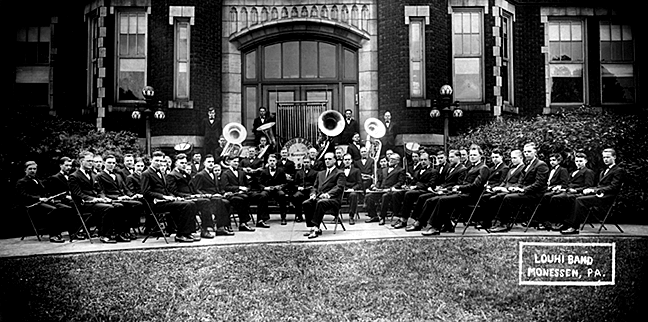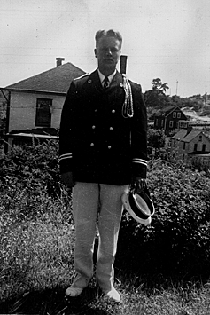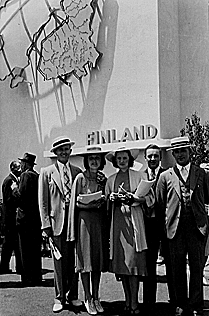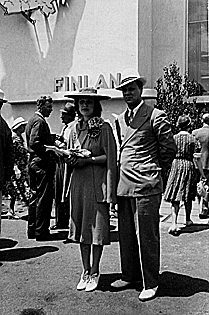
Paul Passoja was born in Monessen, Pennsylvania August 7, 1907 seven years after the beginning of the Louhi Band. He was the son of Charles and Wilhemina Passoja who were immigrants from Finland. His father instilled in the family the love of music. Mr.Passoja played the trombone in the Louhi Band in the early years of the band. Each of his children played a musical instrument. Elma, the oldest, played the piano. She played in the Monessen High School Orchestra, the Finnish Church Orchestra, and the Church Chorus. From 1915 to 1921 all of these muscal groups were under the direction of George Walstrom the eminent Finnish American conductor. Paul the oldest son in the Passoja family learned to play the tuba. It was George Walstrom that got Paul started on his instrument just as he had done with many other children of immigrants.
Ernest, the second son, played the trombone, the instrument his father played. After playing with the Louhi Band and various dance bands locally he played with the nationly known Horace Heidt Orchestra. He spent most of his career with the NBC radio staff orchestra in Chicago. He was a featured trombone soloist on the Carnation Hour, the Don NcNeil Breakfast Club, and other programs. At the end of his career he taught intrumental music in Chicago and later in Florida. Edwin, the third son also played the trombone. Everett, the youngest member of the family, played the cornet. They both played in the Louhi Band.
Paul became a talented tuba player, arranger of music, composer, teacher and band leader. He started his music career playing for the Louhi Band and the Monessen High School Band. Much credit must be given to his father for creating the disciplined atmosphere for learning to play the tuba. The Louhi Band gave the children of immigrants the chance to hear good music. Finally, it was the conductors of the Louhi Band who developed the raw talent in the community into seasoned musicans. This was especially true of George Walstrom who was the conductor from 1915 to 1921. He was the also the conductor in 1905 before he moved to another Finnish community. Louis Koski the conductor and composer of the early nineteen thirties also stands out.

The Louhi Band had a rehearsal twice a week at the Finnish Temperance Hall in Monessen, Pennsylvania. It had a Wednesday evening and a Sunday morning practice session. The Sunday morning practice session started at seven oclock in the morning.
My wife Virgina's grandparents lived directly across the street from the Temperance Hall on Chestnut Street. Her Aunt Esther still speaks fondly of growing up in that area of Monessen. Even though she and her parents were not Finns there was a common interest in good music. Her parents came from Northern Italy near Trieste. Family members either played musical instruments or sang. Esther remembers her parents sitting on the front porch of their home on Sunday mornings with their coffee listening to the Louhi Band rehearsal. These rehearsals lasted until it was time to go to church. One of her favorite compositions that was played during the rehearsals was Finlandia.The whole neighborhood enjoyed these twice a week rehearsals.
Amateur plays were performed on the stage of the Temperance Hall by some of the local Finns. Groups from other Finnish communities in Ohio and West Virginia also came to perform there. The Monessen Finns would go to the other Finnish communities to perform in plays as well. All of the Finnish communities seemed to have amateur actors and athletes. Virginia's, Aunt Esther remembers the pole vaulting and the races that took place outside the Temperance Hall. The basement of the hall had a restaurant where the single men ate and had their lunches packed before going to work, The third floor was used to store stage equipment, Louhi Band uniforms and other vital equipment.
Paul Passoja applied for a scholarship to the Ernest Williams Conservatory of Music in New York City. For his audition he played the The Carnival of Venice on the tuba. This is usually a cornet solo. He was immediately accepted to study there. After completing his studies in New Yory City, Paul went to study music at West Virginia Wesleyan University in Buchanan. This gave him the credentials to teach music in the public schools. Paul then became the music supervisor in the schools of Mannington, West Virginia. He also taught music at West Virginia Wesleyan. Paul came back to Monessen in 1936 to teach music and to become the conductor of the high school band He also became the conductor of the Louhi Band. The high school band grew to nearly one hundred members, and it became well known after Paul Passoja became the director. At the same time he attend Duquesne University in Pittsburgh. There he received a masters degree in music. In 1938 he married Eva Niemela who was a public school teacher. Eva was the daughter of Finnish immigrants. Paul and Eva had no children.
The Louhi Band gave many concerts in the nineteen thirties. Under Mr. Passoja's leadership they traveled to Chester, Pennsylvania in 1938 to play at the dedication of the monument honoring the Finns who came to the New World in 1638 as part of the New Sweden Colony. The band went to the New York World Fair in June 1940 to be part of the Finland Day program. During the winter of 1939 and 1940 the band gave concerts to raise money for the Finnish War relief. Before the war Mr. Passoja was planning to take the Louhi Band to Finland, but that changed due to the start of hostilities.



During the nineteen thirties many Finnish families were moving away in the search of employment. The large tin mill in Monessen had ceased operations. Many young people married outside of the Finnish community and were moving away. Paul Passoja kept up the number of players in the band by recuiting talented players of other nationalities who played in the high school bands in Monessen and Charleroi. The reputation of the Louhi Band was so great that it was a honor to join. One of the young men he recruited spent the rest of his life playing for the Pittsburgh Symphony
When most of the young men were called to serve in World War II the Louhi Band had to cease functioning. The Louhi Band never played again. Paul Passoja continued to teach music at the high school and play the tuba for the Shriners Band in Pittsburgh. He also directed the church choir. On June 5, 1963 he died suddenly at the age of fifty-five.
Learn more about the Louhi Band and Monessen Finnish culture
• The Monessen Finnish Louhi Band by Eva Niemela Passoja
• I Remember Monessen by Elma Passoja Niemela